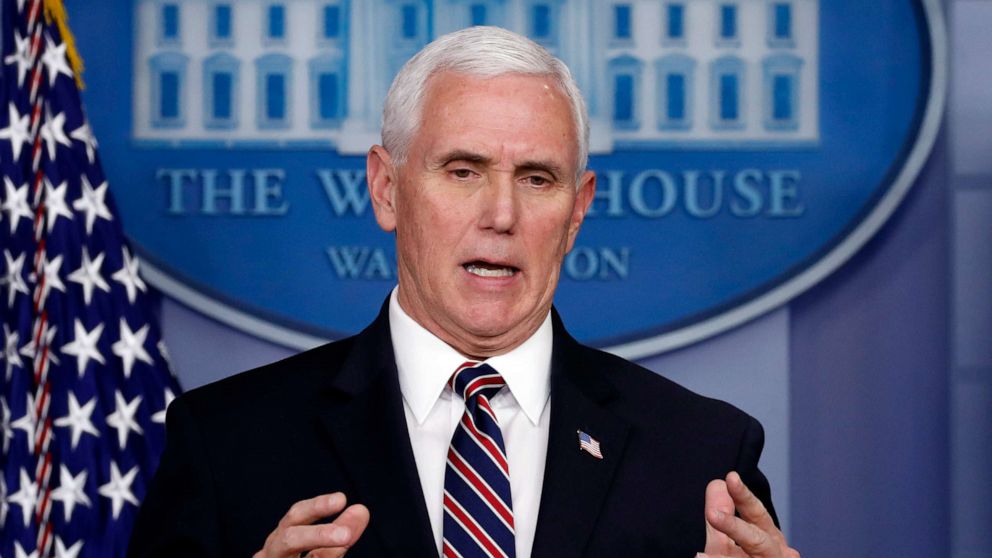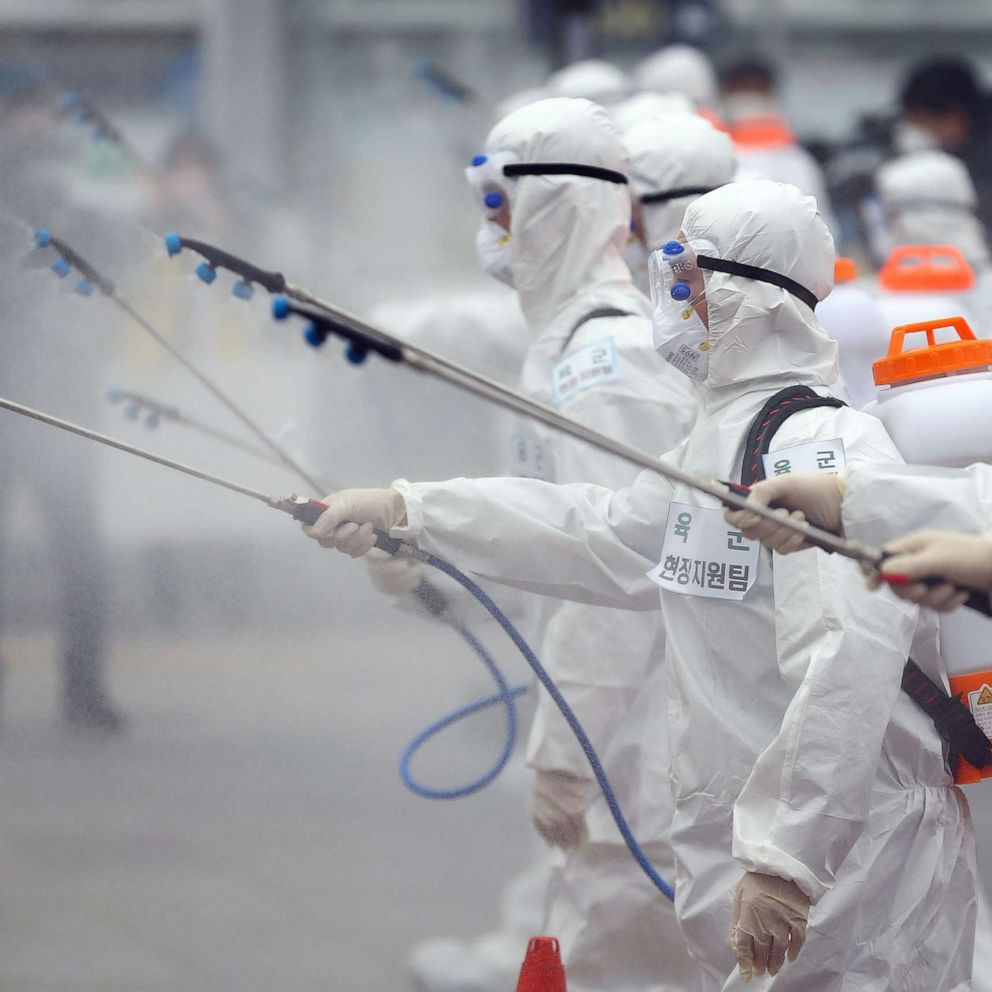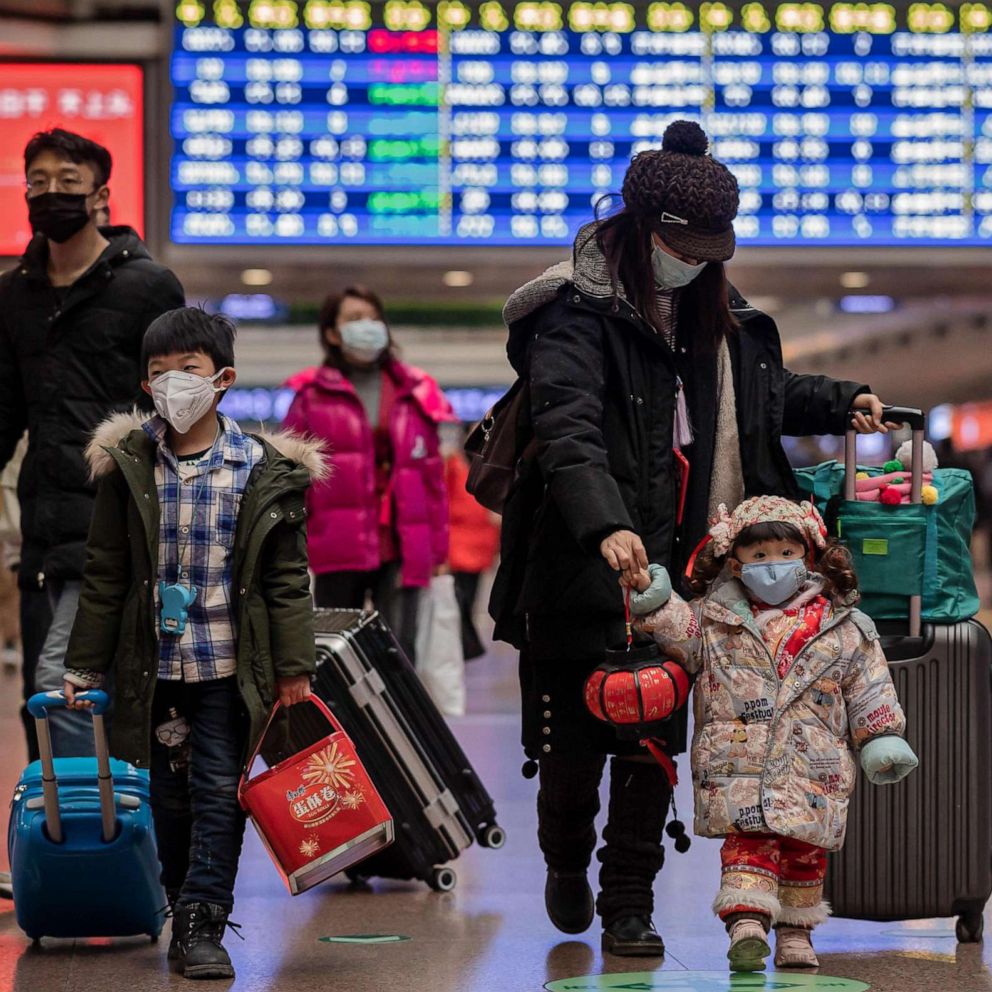Coronavirus government response updates: Pence says advisory on masks, facial coverings coming in next few days
Despite a growing number of governors issuing stay-at-home orders in an effort to slow the spread of the novel coronavirus, President Donald Trump is still resisting a nationwide stay-at-home directive, even as his medical experts say strict social distancing is key to keeping the death toll closer to 100,000 American lives.
As the president and his coronavirus task force on Thursday weigh additional measures, including possible domestic flight restrictions an whether to recommend facial coverings in public, the U.S. health system moved closer to a widespread crisis. Hospitals across the country face shortages of protective gear and medical supplies needed to diagnose and treat the infected as the national stockpile nears depletion, Trump himself has confirmed.
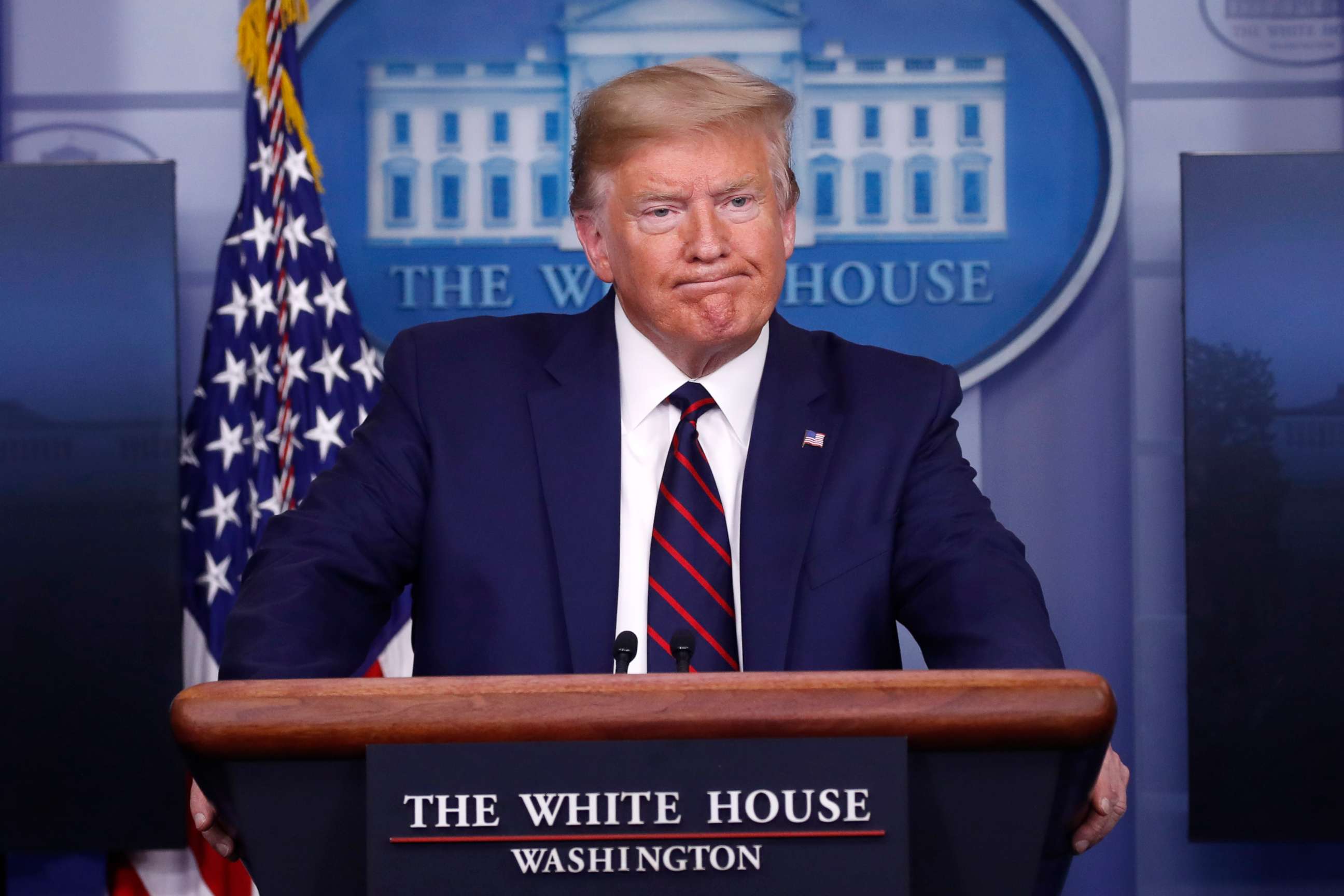
In addition to slowing the spread, the federal government is seeking to shore up the economy. Democrats are pushing another round of relief amid a volatile stock market and nearly 10 million jobless claims in the past two weeks, but the Senate's Republican leader is raising concerns over the cost.
Tune into ABC at 1 p.m. ET and ABC News Live at 4 p.m. ET every weekday for special coverage of the novel coronavirus with the full ABC News team, including the latest news, context and analysis.
Here are Thursday's most significant developments in Washington:
- Vice President Mike Pence says government advisory on masks, facial coverings coming in next few days
- Treasury Secretary Steve Mnuchin said relief payments would now be direct deposited within 2 weeks instead of 3
- Trump says national stockpile of personal protective equipment is near depletion because government "sending it directly to hospitals"
- Residents from at least 38 states, Washington, D.C. and Puerto Rico are under orders to stay home as Trump resists nationwide call
- FEMA asks the Department of Defense for 100,000 body bags
Here are the latest developments in the government response:
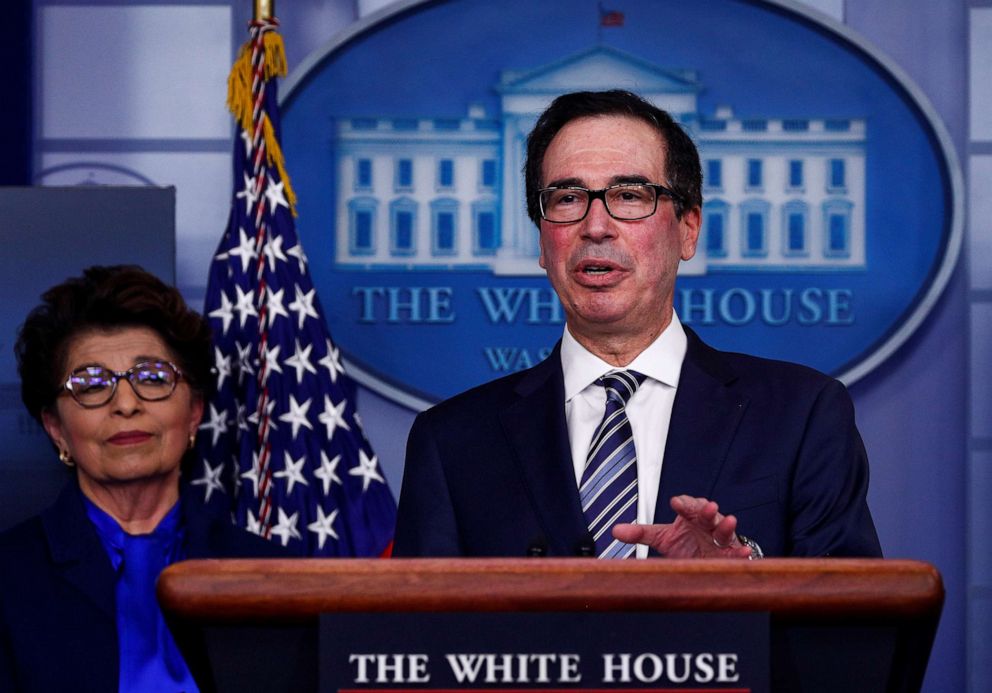
Mnuchin: Relief payments now to be direct deposited starting in 2 weeks, not 3
Treasury Secretary Steve Mnuchin announced at Thursday's White House briefing that relief payments -- as much as $1,200 per person -- would now start to be sent out in two weeks -- faster than originally planned.
"I'm pleased to report that within two weeks the first payments will be direct deposit into taxpayers' accounts," Mnuchin said, after previously saying the payments would take three weeks. "If we don't have your direct deposit information, we'll be putting up a web portal so that you can put that up."
"I told you this would be three weeks. I'm now committing to two weeks. We're delivering on our commitments," Mnuchin added. "Let me just say when Obama sent out these checks it took months and months."
President Trump also announced to take stronger action to compel private companies to provide needed medical equipment.
“Moments ago, I directed [HHS] Secretary Azar and Acting [DHS] Secretary Wolf to use any and all available authority under the Defense Production Act to ensure that domestic manufacturers have the supplies they need to produce ventilators for patients with severe cases of C-O-V-I-D 19,” Trump said, emphasizing each letter. “You know what that is, right? It's become a very famous term. C-O-V-I-D.”
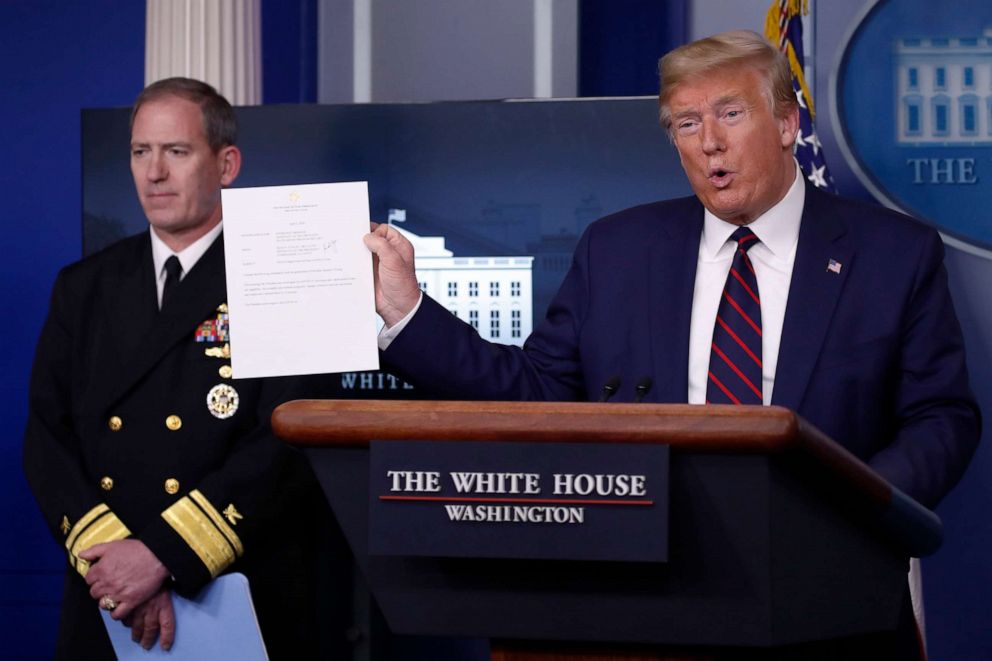
President Trump also said he again tested negative for COVID-19 this morning, saying this time he used a 15-minute rapid test and that the second go-around was “a lot easier” and “much more pleasant.”
“This is from the White House physician. You may have it,” the president said, holding up a White House memo with his negative test results. “I think I took it really out of curiosity to see how quickly it worked and fast it worked.
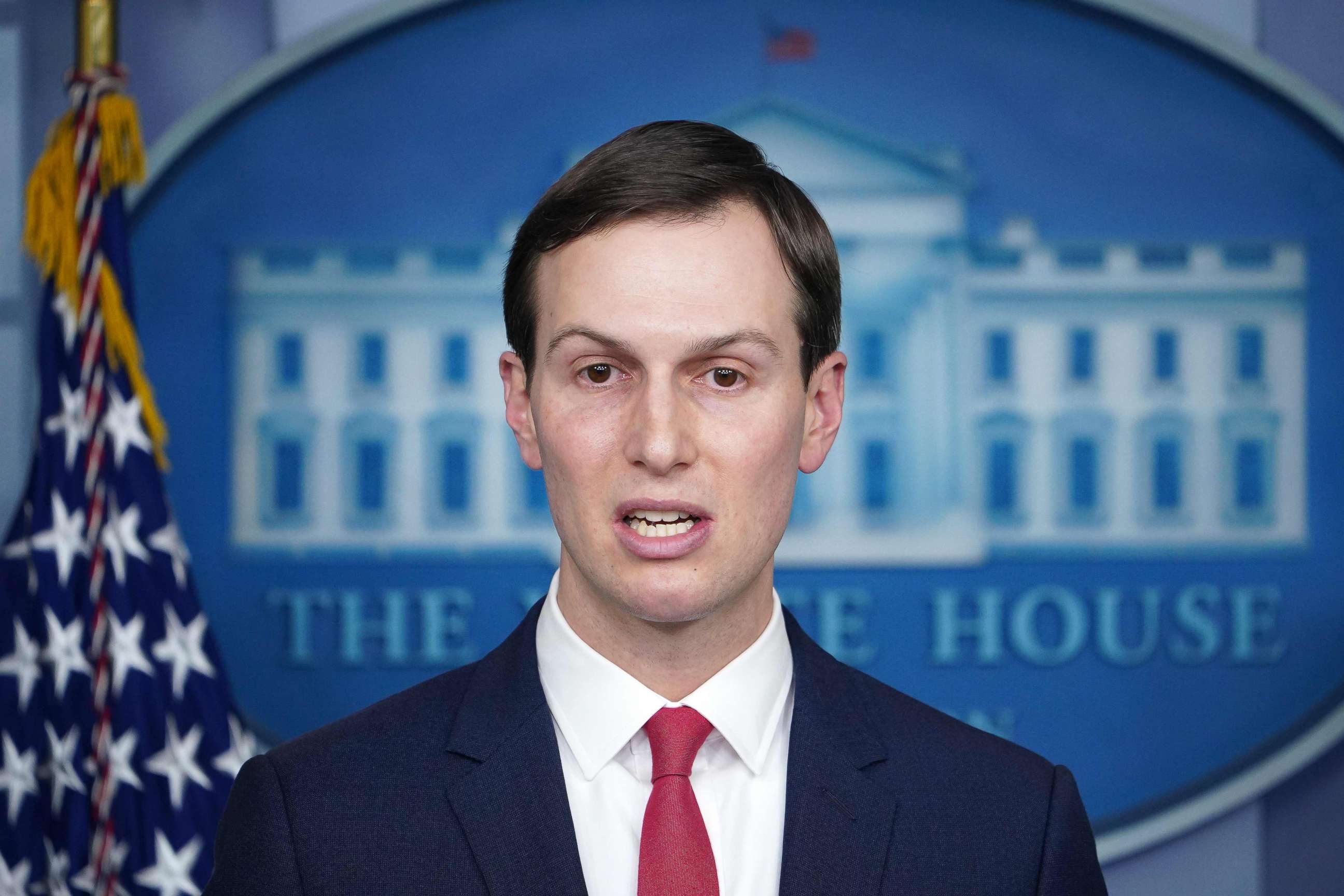
Senior adviser Jared Kushner made his first appearance at a task force briefing on Thursday and took to the podium to praise his father-in-law’s response to the pandemic.
“This truly is a historic challenge. We have not seen something like this in a very, very long time, but I am very confident that by bringing innovative solutions to these hard problems, we will make progress," Kushner said, who said he was involved in getting more supplies to his home state of New York.
Rear Adm. John Polowczyk -- the Navy officer working with FEMA and charged with fixing the coronavirus supply chain -- said at that the federal government is in the process of sending 200,000 N95 respirators masks to New York.
"Help is on the way," Vice President Mike Pence interjected.
This comes as healthcare workers in New York have been making desperate pleas for more protective gear as many wage battle against COVID-19 on the frontlines with inadequate PPE.
Trump, criticized for the federal government not providing desperately needed medical equipment, continued to insist that the federal government is a "backup" for the states on procurement and continued to blame states for not stocking up before the pandemic.
"What they should do is, long before this pandemic arrived, they should have been on the open market when there was no competition -- could've made a great price. The states have to stock up. It's one of those things. They waited," Trump said.
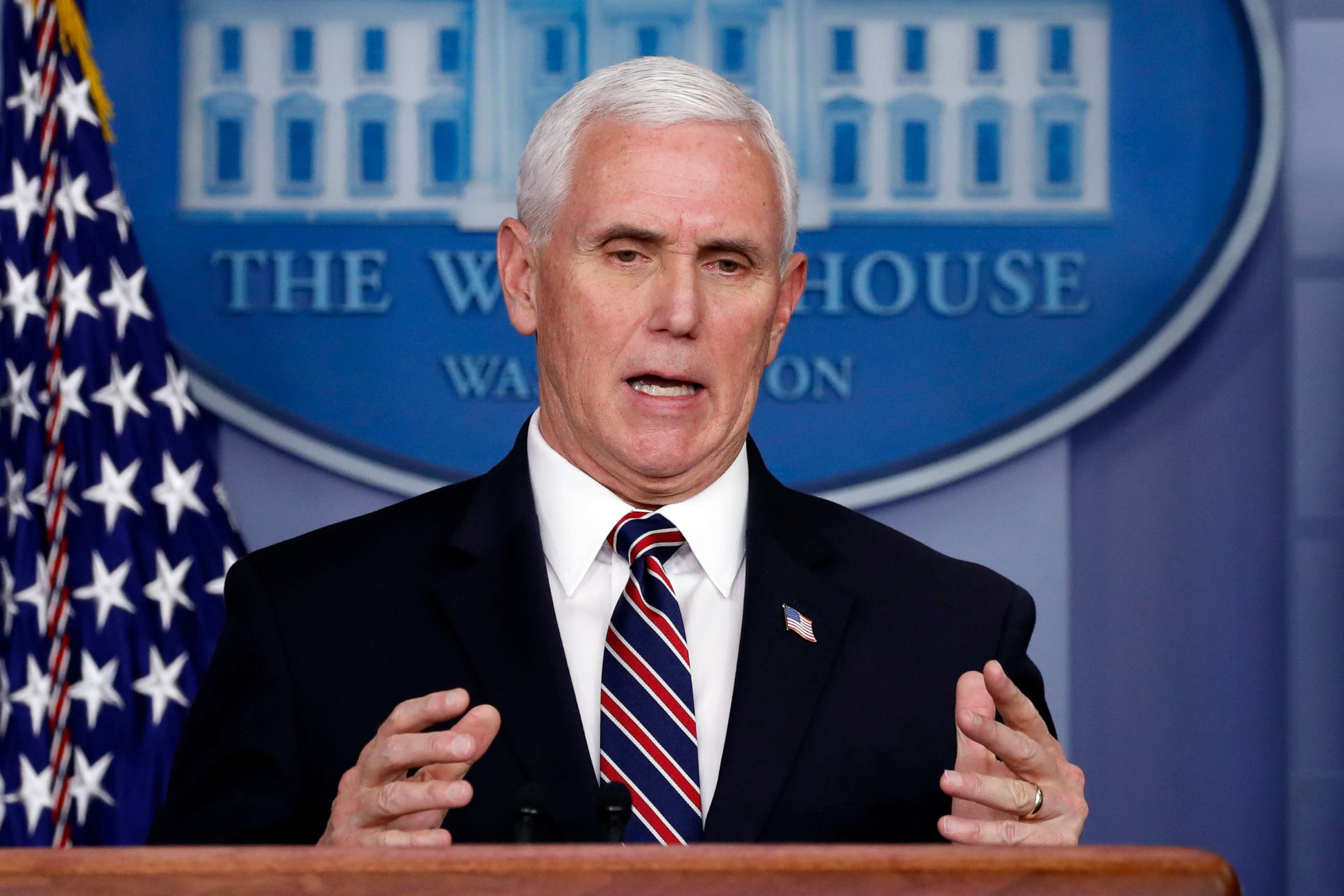
Pence said the White House is considering direct payments to hospitals to cover COVID-19 treatment costs for uninsured Americans and that "the president will make a final decision tomorrow."
"The White House coronavirus task force is working on a proposal for the president to use some of the $100 billion that we are making available to hospitals to compensate the hospitals directly for any coronavirus treatment that they provide to uninsured Americans," Pence said. "The president has made it very clear, we don't want any American to worry about the cost of getting a test where the cost of getting treatment."
President said definitively that he won't reopen Obamacare enrollment for those Americans who may have lost a job during this crisis but said he wants to provide direct payments to those Americans instead.
An advisory on masks will be announced in a few days, Pence said at the briefing, but not before Dr. Deborah Birx, White House coronavirus response coordinator, urged Americans not to use masks as a safety net in place of other precautions.
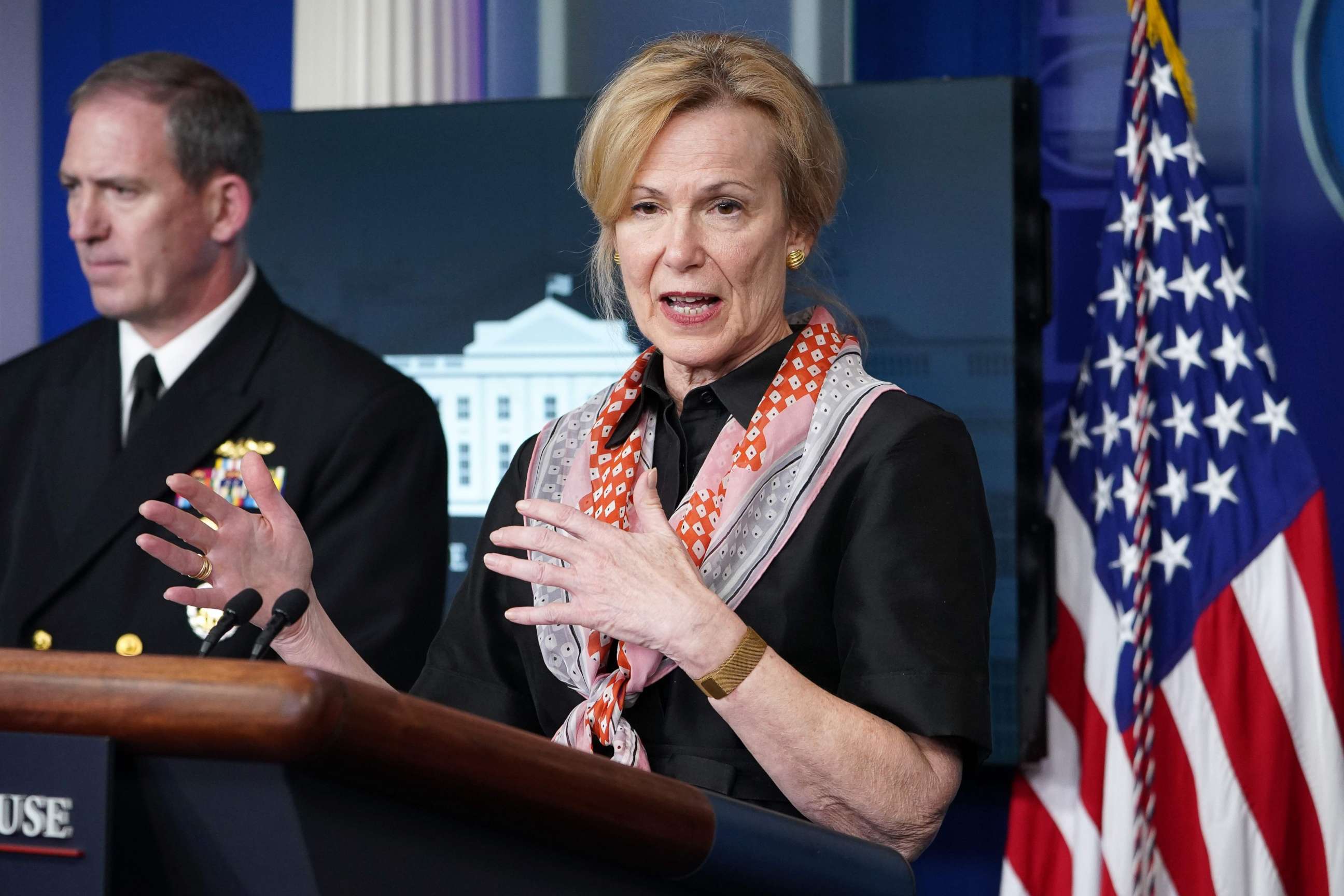
"The most important thing is the social distancing and washing your hands. And we don't want people to get an artificial sense of protection because they are behind a mask," Birx said. "Remember, your eyes are not in the masks. So if you're touching things and then touching your eyes, you are exposing yourself in the same way."
Masks can keep people who are already sick from spreading germs, Birx said, but while "you may be protecting others," she said people shouldn't "get a false sense of security that that mask is protecting you exclusively from getting infected.
"We want to make sure everybody understands it is not a substitute for the presidential guidelines that have already gone out and to be absolutely clear about that," she said.
FDA eases restrictions on gay and bisexual men to donate blood
The Food and Drug Administration revised its blood donor guidelines on Thursday, significantly easing the restrictions on men who have sex with men, amid a blood shortage brought on by the coronavirus pandemic.
The new guidance reduces the donation deferral period for sexually active gay and bisexual men from 12 months of required abstinence to three months.
FDA Commissioner Stephen Hahn confirmed the news in a tweet.
The FDA says the change will be only during the COVID-19 emergency, and they will consider making the change permanent when the pandemic response is over.
FEMA asks the Department of Defense for 100,000 body bags
FEMA has requested that the Department of Defense make available 100,000 body bags to assist state health agencies with mortuary affairs. The request comes as the White House revealed this week that 100,000 deaths is "best-case scenario" for Americans facing the pandemic.
The bags are formally called Human Remains Pouches.
"The Department of Defense and the Defense Logistics Agency (DLA) have a longstanding arrangement with FEMA to procure key commodities from DLA's industrial partners during crisis response operations," said Lt. Col. Mike Andrews, Pentagon spokesperson, in a statement. "DLA is currently responding to FEMA's prudent planning efforts for 100,000 pouches to address mortuary contingencies on behalf of state health agencies."
Bloomberg, which was first to report on the request, said DOD will initially draw from its stockpile of 50,000 bags before having to purchase more.
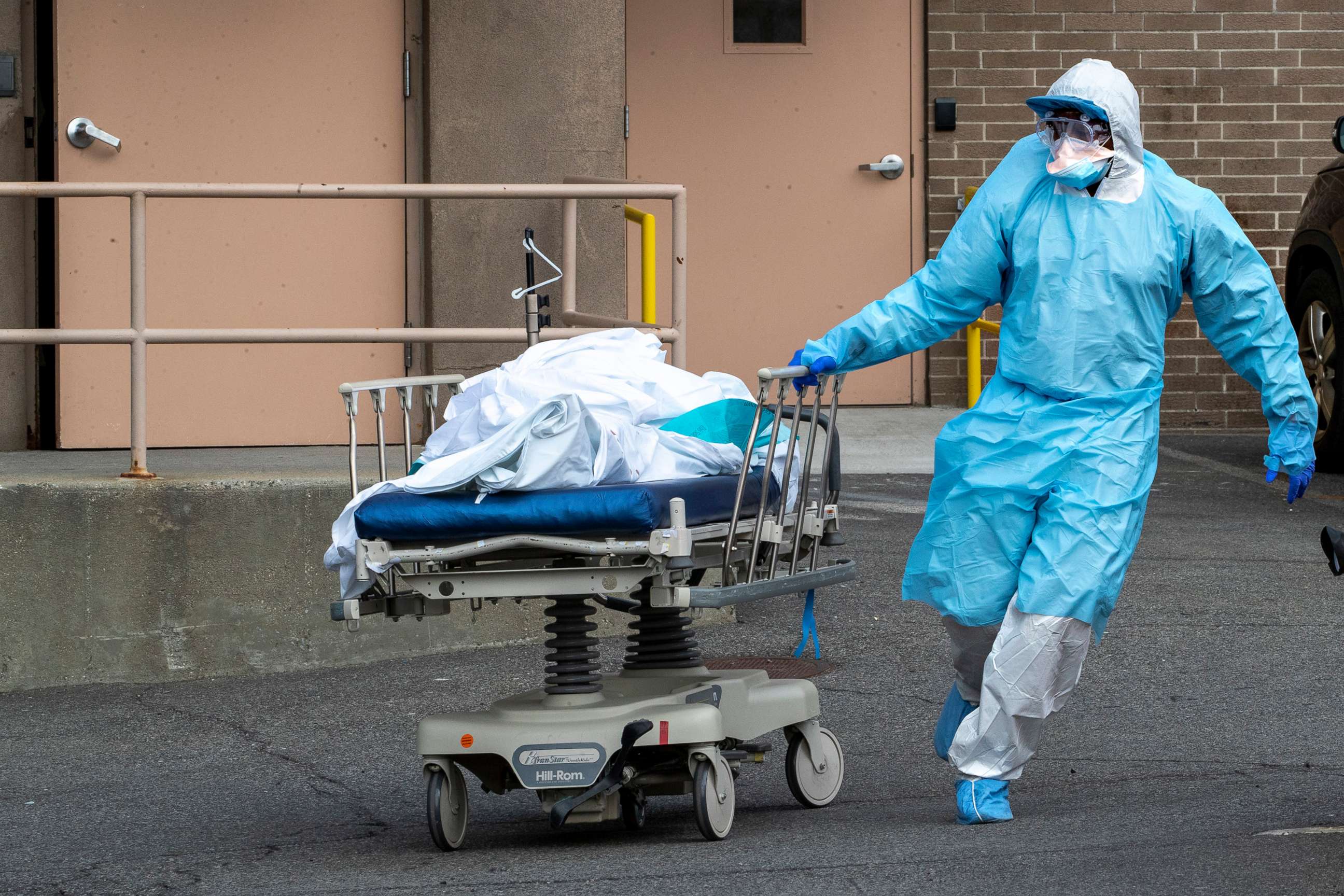
Pelosi creates watchdog panel to oversee COVID-19 spending
House Speaker Nancy Pelosi announced on Thursday the creation of a special House select committee to oversee the $2 trillion federal response to the coronavirus crisis.
Rep. Jim Clyburn, the Democratic whip, will lead the bipartisan panel, which will be authorized to “examine all aspects of the federal response to the Coronavirus and ensure the taxpayer dollars are being wisely and efficiently spent.”
"The panel will root out waste, fraud and abuse; it will protect against price-gauging, profiteering and political favoritism," Pelosi told reporters on a press call. "We need transparency and accountability."
“We face a deadly virus and a battered economy with millions of Americans suddenly out of work,” Pelosi said. “Congress has taken an important step in leading this crisis by passing three bills with over $2 trillion in emergency relief. We need to ensure those dollars are spent carefully and effectively.”
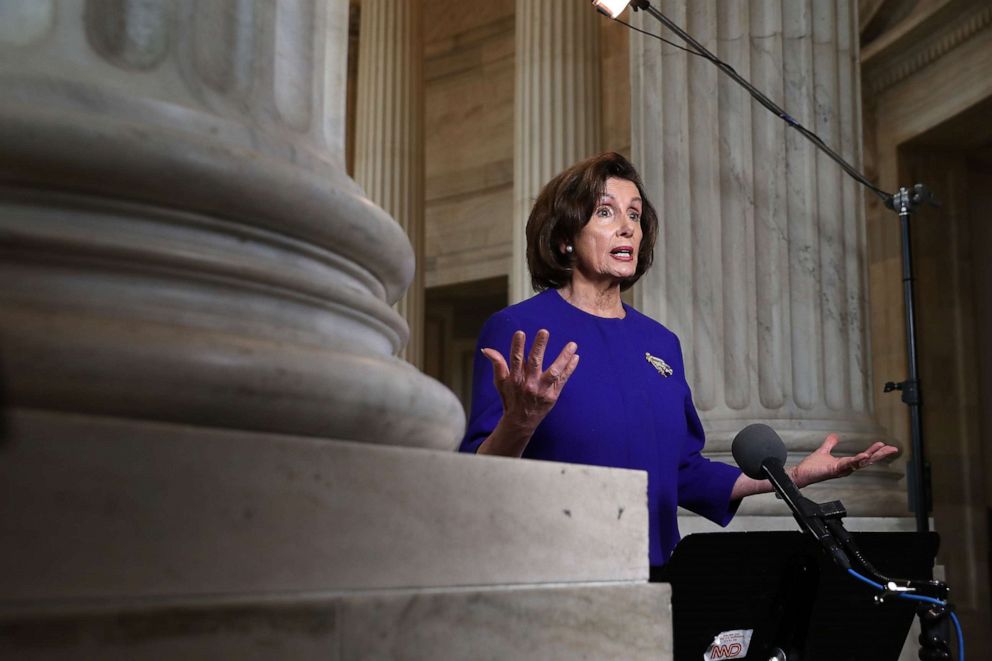
Trump to Schumer: "Stop complaining," calls some governors "complainers"
President Trump told Senate Minority Leader Chuck Schumer in a pair of tweets Thursday morning that "New York has gotten far more than any other State, including hospitals & a hospital ship, but no matter what, always complaining."
Trump made the comments after Schumer told CNN Wednesday night that Trump trade adviser Peter Navarro was not the right person to oversee the administration of the Defense Production Act -- a position that Trump appointed him to last week.
"He's a very nice man, but he has had no experience doing things like this, and they have no one that I can best tell in charge of the distribution," Schumer said.
After Schumer called for a military official to carry out the role instead, Trump this morning said "somebody [should] please explain to Cryin' Chuck Schumer that we do have a military man in charge of distributing goods, a very talented Admiral, in fact."
He was presumably speaking about Rear. Adm. John Polowczyk, who leads FEMA's supply chain task force.
An hour after his tweet to Schumer, the president took to Twitters again and called some governors "complainers," saying it was their fault they weren't prepared ahead of the pandemic.
"Massive amounts of medical supplies, even hospitals and medical centers, are being delivered directly to states and hospitals by the Federal Government. Some have insatiable appetites & are never satisfied (politics?). Remember, we are a backup for them. The complainers should...have been stocked up and ready long before this crisis hit."
The tweet comes as a bipartisan chorus of governors across the country calls for President Trump and the federal government to take better control of the medical equipment procurement and distribution process to states.
One way the president could take a more active approach in procuring equipment is with the Defense Production Act, which several governors have urged him to utilize more, but Trump says he prefers to use it as "leverage" in negotiations with companies.
McConnell to Pelosi: "Stand down" on next coronavirus rescue bill
Republican Leader Mitch McConnell has told House Speaker Nancy Pelosi to "stand down," making it clear he plans to ignore her efforts to jumpstart talks on the next round of coronavirus relief in Congress after Congress passed $2 trillion emergency legislation last week.
"She needs to stand down on the notion that we’re going to go along with taking advantage of the crisis to do things that are unrelated to the crisis," McConnell told the Washington Post Wednesday night.
Despite Trump’s openness to it, leader also threw cold water on the idea of tackling infrastructure.
"We do have to be mindful of how to pay for it. There has been a lot of fantasizing on both sides about massive packages," McConnell said. "We’d all love to do it, but there is the reality of how you pay for it. We just passed a $2 trillion bill, and it would take a lot of convincing to convince me that we should do transportation in a way that’s not credibly paid for after what we just passed last week."
Minority Leader Schumer urged McConnell on Thursday morning to quickly drop his resistance and pass more legislation aimed at blunting the financial fallout from the coronavirus pandemic.
"I think we have to do it, and I hope Leader McConnell will see the light," Schumer said in an interview on MSNBC's "Morning Joe." "The economy is going to take a long time to recover," Schumer said, adding that he would like hazard pay for medical workers in the next bill.
Pelosi said on Wednesday that House Democrats are already drafting language for the next large package which she says will focus on rebuilding water systems and struggling highways and roads amid the crippling crisis.
"We must take bold action to renew America’s infrastructure," House Speaker Nancy Pelosi said during a call with reporters Wednesday afternoon. "We need to invest in infrastructure to address some of the critical impacts and vulnerabilities in America that have been made by the coronavirus."
More than 6.6 million Americans filed for unemployment last week
A record-shattering 6,648,000 people filed for unemployment last week amid the novel coronavirus pandemic, according to a Department of Labor report released Thursday.
The past two weeks have seen 10.4 million Americans file for unemployed claims -- more than during the first six months of the Great Recession.
The service industry, led by accommodation and food services, was among the hardest-hit by the COVID-19 outbreak, according to Thursday's report. Other industries that have been heavily impacted include health care/social assistance, manufacturing, and retail and construction.
Fauci gets personal security detail after receiving threats
The government has ramped up security for Dr. Anthony Fauci, the director of the National Institute of Allergy and Infectious Diseases and member of the coronavirus task force, as he faces threats to his personal safety amid a pandemic.
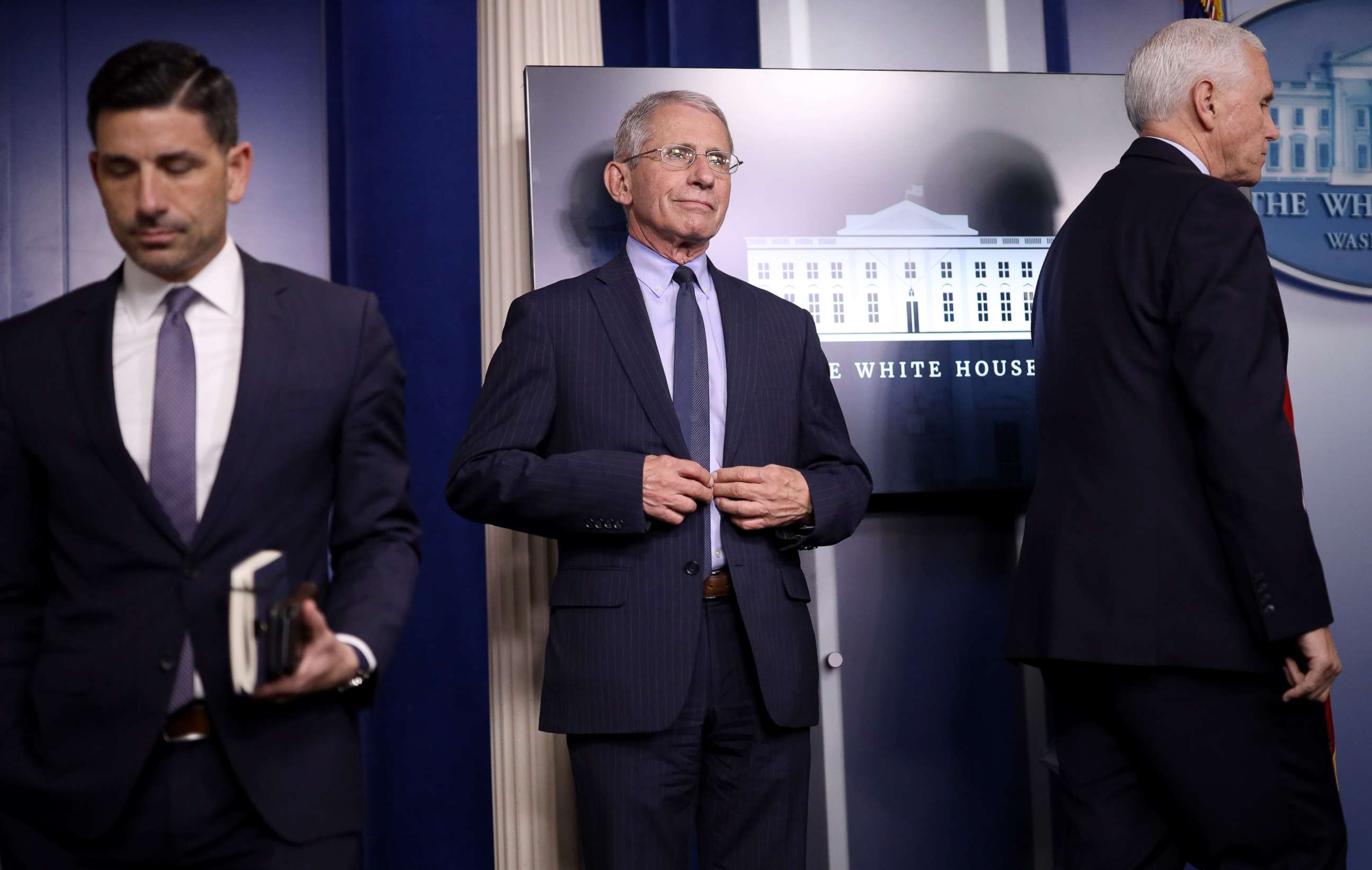
The Washington Post first reported the threats to Fauci and the increased security.
When asked during Wednesday's White House press briefing whether he or Dr. Deborah Birx, the task force coordinator, had received any threats or if they had been given a security detail, Fauci said he was not able to answer and referred the question to Health and Human Services.
Trump quickly chimed in, saying, "He doesn't need security, everybody loves him."
Fauci was asked on NBC's "Today" program Thursday morning about threats against him, and while he didn't confirm any, he said he felt safe.
"I've chosen this life. I mean, I know what it is. There are things about it that sometimes are disturbing, but you just focus on the job you have to do," Facui said. "We have a really, really, very, very difficult situation ahead of us. All of that other stuff is secondary."
What to know about coronavirus:
- How it started and how to protect yourself: coronavirus explained
- What to do if you have symptoms: coronavirus symptoms
- Tracking the spread in the US and Worldwide: coronavirus map
ABC News' Mary Bruce, Ben Gittleson, Jordyn Phelps, Elizabeth McLaughlin, Stephanie Ebbs and Mariam Khan contributed to this report.
